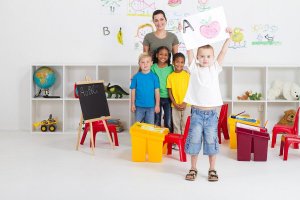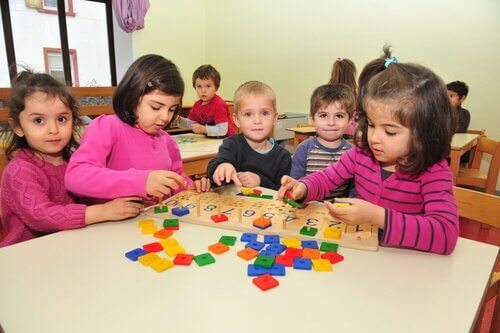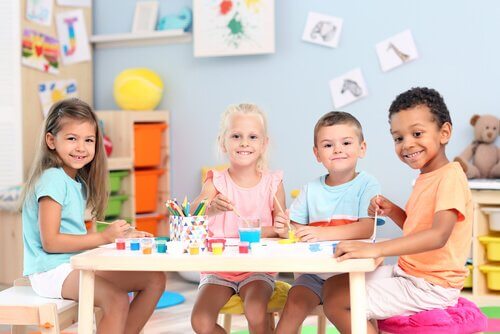Starting Kindergarten: Tips for Preparing Your Children

Despite the fact that over the years it becomes a treasured memory, starting kindergarten can be complicated for children.
Deciding whether or not your children should start kindergarten can be complicated. When you’ve made the decision, you have to face the process of separating them from their parents for a period of time.
Kindergarten can be almost traumatic for many children. When the time comes to leave children in the classroom, there can be some issues that make it hard for children to adapt.
The following suggestions may help you and your children when it comes to starting kindergarten for the first time.
Tips for starting kindergarten
Before beginning, you need to trust yourself and your child. No one knows your child better than you, so apply this advice in the way that makes the most sense for your family.
Explain where you’re going and what kindergarten is
Although they seem young, it’s important to give children all the explanations they need. Give children an understanding of a predictable environment. It will help to calm them down.
It’s better for them to know why you’re taking them to this place, what they’ll do, and what they’ll find there.
Take them to visit
Before the first day, it’s a good idea to bring kids to the kindergarten classroom. Knowing where to go when they arrive, what the building looks like, and above all, what the classroom looks like, can help kids.
Let them experience their first contact with the place with you.

Introduce them to the staff
In particular, introduce children to the person who will be taking care of them. Who better than you to introduce your child to their caretaker?
Sometimes strangers are intimidating or scary for kids. You eliminate this issue if you introduce the person into their life calmly and smoothly.
Don’t make a scene
Avoid reminding kids how much you will miss them or how far apart you’ll be. Children need an emotional support network that makes them feel safe.
Ask them how they feel
Consult them before, during, and after their first time at kindergarten. Let children express how they feel and help them manage all these feelings without feeling bad.
Don’t panic if it isn’t easy at first
The second day can be harder than the first. Be patient, you’ll get it. Like anyone else, it’s normal for children to take a while to adapt to new environments and people they don’t know.
“The task of the modern educator is not to cut down jungles, but to irrigate deserts.”
—C.S. Lewis—
The benefits of adjusting well
Children benefit greatly from having a secure environment when starting kindergarten. Adjusting well provides the following benefits:
- Self-confidence. Being able to take on new situations without fear, and feeling confident in their ability to adapt.
- Independence. They’ll learn to face everything that life puts in front of them without always needing to turn to someone who will tell them what to do. You’re teaching them about their own power to make decisions, their autonomy, and independence.

- Emotional management. Knowing that they can tell you how they feel without being judged or getting in trouble is a great thing. Teaching children that you’re here to listen to them will make them into secure adults who are open about their feelings and capable of managing them.
- Empathy. Kindergarten teaches empathy. Additionally, you have a foundational role in helping your children. Knowing how to recognize their own emotions and those of others helps children with the rest of their environment.
It seems like starting kindergarten will be a complicated adjustment process, but don’t panic. Understand that all parents get nervous about facing new situations.
Parents can help by imagining how their children feel and help them feel safe and motivated. They need to know that you aren’t abandoning them at kindergarten, but rather you’re including a new routine in your lives.
Despite the fact that over the years it becomes a treasured memory, starting kindergarten can be complicated for children.
Deciding whether or not your children should start kindergarten can be complicated. When you’ve made the decision, you have to face the process of separating them from their parents for a period of time.
Kindergarten can be almost traumatic for many children. When the time comes to leave children in the classroom, there can be some issues that make it hard for children to adapt.
The following suggestions may help you and your children when it comes to starting kindergarten for the first time.
Tips for starting kindergarten
Before beginning, you need to trust yourself and your child. No one knows your child better than you, so apply this advice in the way that makes the most sense for your family.
Explain where you’re going and what kindergarten is
Although they seem young, it’s important to give children all the explanations they need. Give children an understanding of a predictable environment. It will help to calm them down.
It’s better for them to know why you’re taking them to this place, what they’ll do, and what they’ll find there.
Take them to visit
Before the first day, it’s a good idea to bring kids to the kindergarten classroom. Knowing where to go when they arrive, what the building looks like, and above all, what the classroom looks like, can help kids.
Let them experience their first contact with the place with you.

Introduce them to the staff
In particular, introduce children to the person who will be taking care of them. Who better than you to introduce your child to their caretaker?
Sometimes strangers are intimidating or scary for kids. You eliminate this issue if you introduce the person into their life calmly and smoothly.
Don’t make a scene
Avoid reminding kids how much you will miss them or how far apart you’ll be. Children need an emotional support network that makes them feel safe.
Ask them how they feel
Consult them before, during, and after their first time at kindergarten. Let children express how they feel and help them manage all these feelings without feeling bad.
Don’t panic if it isn’t easy at first
The second day can be harder than the first. Be patient, you’ll get it. Like anyone else, it’s normal for children to take a while to adapt to new environments and people they don’t know.
“The task of the modern educator is not to cut down jungles, but to irrigate deserts.”
—C.S. Lewis—
The benefits of adjusting well
Children benefit greatly from having a secure environment when starting kindergarten. Adjusting well provides the following benefits:
- Self-confidence. Being able to take on new situations without fear, and feeling confident in their ability to adapt.
- Independence. They’ll learn to face everything that life puts in front of them without always needing to turn to someone who will tell them what to do. You’re teaching them about their own power to make decisions, their autonomy, and independence.

- Emotional management. Knowing that they can tell you how they feel without being judged or getting in trouble is a great thing. Teaching children that you’re here to listen to them will make them into secure adults who are open about their feelings and capable of managing them.
- Empathy. Kindergarten teaches empathy. Additionally, you have a foundational role in helping your children. Knowing how to recognize their own emotions and those of others helps children with the rest of their environment.
It seems like starting kindergarten will be a complicated adjustment process, but don’t panic. Understand that all parents get nervous about facing new situations.
Parents can help by imagining how their children feel and help them feel safe and motivated. They need to know that you aren’t abandoning them at kindergarten, but rather you’re including a new routine in your lives.
All cited sources were thoroughly reviewed by our team to ensure their quality, reliability, currency, and validity. The bibliography of this article was considered reliable and of academic or scientific accuracy.
- Alpi, L. (2002). Adaptación a la escuela infantil: niños, familias y educadores al comenzar la escuela (Vol. 49). Narcea Ediciones.
- Bossi, T. J., Brites, S. D. A. N. D., & Piccinini, C. A. (2017). Adaptación a la Guardería: Factores que Facilitan o no este Período. Paidéia (Ribeirão Preto), 27, 448-456. https://www.scielo.br/scielo.php?pid=S0103-863X2017000400448&script=sci_abstract&tlng=es
- Rodríguez Pelegrín, I. M. (2009). La importancia del periodo de adaptación en el alumnado de tres años: una experiencia práctica. http://repositorio.ual.es/bitstream/handle/10835/5664/893-3257-1-PB.pdf?sequence=1
- Albornoz Zamora, E. J. (2017). La adaptación escolar en los niños y niñas con problemas de sobreprotección. Revista universidad y sociedad, 9(4), 177-180. http://scielo.sld.cu/scielo.php?script=sci_arttext&pid=S2218-36202017000400024
This text is provided for informational purposes only and does not replace consultation with a professional. If in doubt, consult your specialist.








